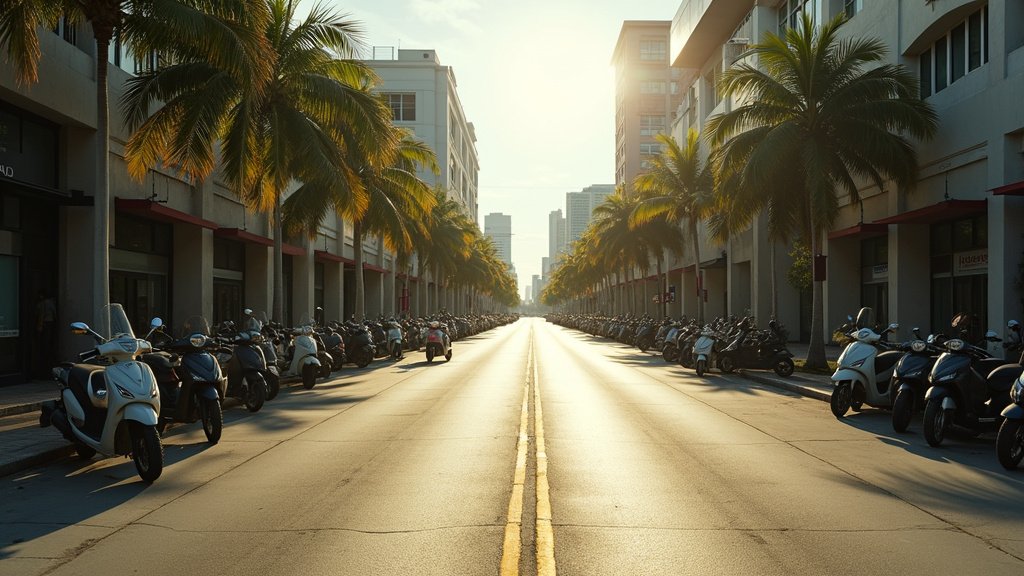Miami’s vibrant streets, once bustling with the whir and hum of thousands of scooters and mopeds, have grown noticeably quieter. What was a rapidly trending and essential mode of transportation for hundreds of thousands of newly arrived immigrants, primarily from Latin American nations, has experienced a dramatic and swift decline. This significant shift, which began in early 2025, is a direct consequence of escalating immigration enforcement under Donald Trump’s administration, turning a convenient commute into a perilous gamble for many. The ripple effect extends far beyond the two-wheeled vehicles, deeply impacting local businesses and the broader Miami economy.
The Ascendance of a Two-Wheeled Lifeline
For years, Miami-Dade County has served as a primary gateway for immigrants from countries like Cuba, Haiti, Venezuela, and Nicaragua, fostering a rich multicultural environment. Many of these newcomers, accustomed to similar transportation methods in their home cities, found Miami’s public transportation infrastructure to be inadequate for their needs. As the region grappled with growing traffic congestion and limited mass transit options, scooters and mopeds emerged as an accessible and economic solution for navigating the city. The news of this boom became apparent between 2022 and 2023 as small vehicles multiplied on thoroughfares, offering an affordable alternative to cars, which often required credit scores and more stringent documentation for purchase. Immigrant-friendly financing options for mopeds, sometimes requiring only a foreign passport and allowing installment payments of $500 to $600 a month over three months, made them an immediate lifeline for those seeking to work and move freely within the sprawling metropolis.
The Chill Wind of Policy Change
The headline-grabbing shift in Miami’s transportation landscape directly coincides with a renewed federal crackdown on immigration. At the core of this change is the Trump administration’s decision to cancel humanitarian parole visas for individuals who arrived through programs like the CHNV (Cuban, Haitian, Nicaraguan, and Venezuelan) and CBP One. This policy change, upheld by the Supreme Court’s emergency request to terminate humanitarian parole status, abruptly stripped legal status from hundreds of thousands of individuals, thrusting them into a precarious legal limbo and making them vulnerable to deportation. With promises of mass deportations and a stated goal of 3,000 arrests per day, the federal government’s aggressive stance has instilled widespread fear.
Economic Fallout: Businesses on the Brink
The immediate and most visible impact of this immigration policy pivot has been on local scooter and moped businesses. Owners like Boris Pedraza of El Rey de las Motos, a prominent scooter dealership in Miami, report catastrophic plummeting sales. Where Pedraza once sold upwards of ten mopeds a day, his sales have dwindled to just one or two a week. Many new dealerships that emerged during the boom have already been forced to close their doors. Yonathan Rodríguez, a long-time supplier of moped parts to local shops, describes the fear as palpable. He notes that driving a moped in Miami has become “like having a tattoo on your face,” signaling to authorities an individual’s potential undocumented status and making them an easy target for stops and interrogations. The mass deportations over the past six months, he explains, have profoundly affected all businesses specializing in these vehicles, forcing many to undergo significant restructuring to simply stay afloat.
Living in Fear: A Daily Peril
For the immigrant communities in Miami, the stakes are profoundly personal. The fear of being stopped for a minor traffic infraction, only to face detention and deportation due to a lack of proper documentation, has become an overwhelming reality. Immigrants now widely perceive mopeds as a magnet for immigration officials, who are reportedly conducting raids in workplaces, farms, and on highways across Florida. This pervasive anxiety has led many to abandon their mopeds, even those who initially relied on them for vital transportation to jobs and appointments. The constant threat of arrest has also prompted families to take drastic preparatory measures, with some seeking legal assistance to create ‘power of attorney’ documents to ensure the care of their U.S.-born children in the event of parental detention or deportation.
Broader Economic and Social Ripple Effects
The effects of the intensified immigration enforcement extend far beyond the scooter market. Miami’s real estate sector is also experiencing a downturn, with reports indicating a significant decrease in housing transactions and a notable drop in rental prices. Even legal immigrants and foreign investors are reportedly hesitant to commit to the market, citing concerns about uncertain visa extensions and changing immigration policies. Furthermore, Florida’s economy faces broader challenges; a potential mass deportation could exacerbate existing labor shortages in critical sectors such as agriculture, construction, and hospitality. With significantly fewer available workers than open jobs, the economic implications are severe, underscoring the interconnectedness of immigration policy with local commerce and daily life. Even tourism to South Florida has seen a decline, partly attributed to immigration policies deterring travelers from key international markets.
As Miami navigates this complex intersection of federal policy and local reality, the quiet streets and struggling businesses serve as a stark reminder of how deeply immigration debates resonate within the fabric of American cities. The fizzling of Miami’s scooter boom is more than just a transportation story; it’s a compelling narrative about the human and economic costs of shifting immigration enforcement strategies.





